How My Diagnosis Improved my College Experience
By Blair Kenney

My diagnosis marked the first step along my path toward self-exploration and self-acceptance
-Blair Kenney
I was diagnosed with dyslexia during the summer of my sophomore year at Yale University. After the diagnosis, I slowly began to see my struggles in school in a more positive light. Ways I had developed to compensate in high school—such as taking extra science classes to avoid long reading lists, memorizing the prepositions for every verb that I planned to use in an upcoming in-class essay, and taking creative writing classes to escape having to organize my writing to support a thesis—no longer seemed to be silly techniques to mask my inadequacies. When my learning specialist convinced me that I was an intelligent person with a reading disorder, I gradually stopped hiding from what I was most afraid of—the belief that I was a person of mediocre intelligence with overambitious goals for herself. As I slowly let go of this fear, I became much more aware of my learning issues. For the first time, I felt that I could dig below the surface of my unhappiness in school without being ashamed of what I might find.
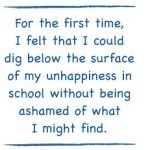 My diagnosis marked the first step along my path toward self-exploration and self-acceptance. Instead of criticizing myself for being slow in school, I started to explore how I was different; and I began to see these differences as a reflection of the unique way that my mind worked, not as a lack of intelligence. When I felt myself wanting to rebel against reading for my college classes, I acknowledged the way I was feeling and asked myself what I could do to make reading more enjoyable: Did I want to read out loud? Listen to the book on tape while running on the treadmill? Take breaks every 20 minutes? Ask a friend what the reading was about before sitting down to read it myself?
My diagnosis marked the first step along my path toward self-exploration and self-acceptance. Instead of criticizing myself for being slow in school, I started to explore how I was different; and I began to see these differences as a reflection of the unique way that my mind worked, not as a lack of intelligence. When I felt myself wanting to rebel against reading for my college classes, I acknowledged the way I was feeling and asked myself what I could do to make reading more enjoyable: Did I want to read out loud? Listen to the book on tape while running on the treadmill? Take breaks every 20 minutes? Ask a friend what the reading was about before sitting down to read it myself?
Before I received my diagnosis, I did not grant myself much permission to individualize the way that I studied; I saw such allowances as only confirming the fact that I was not as smart as my peers. Since receiving my diagnosis, however, I have become a much better advocate for my learning needs and have enjoyed school much more as a result. The energy that I had spent covering up this important side of myself could now be used to ask for help and to explore the ways that I most successfully learn.
My diagnosis has also helped me to take myself a 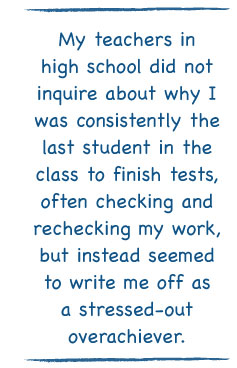 little less seriously. Now, when I make a dyslexic mistake, I usually laugh. Understanding my dyslexia (both the strengths and the weaknesses that come with it) makes it possible for me to feel more comfortable with my learning difficulties and with myself. Soon after I was diagnosed, I started making jokes about myself, talking to my friends about my challenges, and cutting myself slack when I needed it. Of course, I still experienced moments in school when I found it hard to laugh, but these times were greatly reduced once I had a concrete explanation that validated my struggle.
little less seriously. Now, when I make a dyslexic mistake, I usually laugh. Understanding my dyslexia (both the strengths and the weaknesses that come with it) makes it possible for me to feel more comfortable with my learning difficulties and with myself. Soon after I was diagnosed, I started making jokes about myself, talking to my friends about my challenges, and cutting myself slack when I needed it. Of course, I still experienced moments in school when I found it hard to laugh, but these times were greatly reduced once I had a concrete explanation that validated my struggle.
Seeking a learning specialist and having my concerns validated with an official diagnosis of a learning disability gave my confidence a much-needed boost. For many years, I felt misunderstood in school. When I would tell my parents that I was concerned that I seemed to read more slowly than my peers, their response was, “Blair, you think too much. Don’t compare yourself to other people in this way.” In addition, my teachers in high school did not inquire about why I was consistently the last student in the class to finish tests, often checking and rechecking my work, but instead seemed to write me off as a stressed-out overachiever.
When I first heard that I had dyslexia, I was overwhelmed by emotions; I was angry, sad, and very confused. With time, I began to see my diagnosis as a self-affirmation. I had been correct in suspecting that I had a problem with learning, when many of the adults around me said that the only issue was my anxiety. I had adapted to school, devising personal coping strategies and learning techniques.
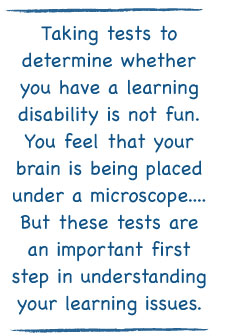 Taking tests to determine whether you have a learning disability is not fun. You feel that your brain is being placed under a microscope, and that there is nothing you can do to cover up what you see as glaring holes in your mental wiring. You then receive a report with many numbers, which likely will mean more to the learning specialist than they will to you. But these tests are an important first step that provide a concrete explanation from which you can proceed to investigate your learning issues with less fear and more clarity. As I gained a greater understanding of how I most effectively learn, the numbers on my testing results became less important, and I came out the other side with a greater level of confidence and self-awareness.
Taking tests to determine whether you have a learning disability is not fun. You feel that your brain is being placed under a microscope, and that there is nothing you can do to cover up what you see as glaring holes in your mental wiring. You then receive a report with many numbers, which likely will mean more to the learning specialist than they will to you. But these tests are an important first step that provide a concrete explanation from which you can proceed to investigate your learning issues with less fear and more clarity. As I gained a greater understanding of how I most effectively learn, the numbers on my testing results became less important, and I came out the other side with a greater level of confidence and self-awareness.
ABOUT THE AUTHOR:
Blair graduated in 2008 from Yale with a degree in psychology. Currently, she has a Yale fellowship in child development and early childhood education, and works with children in kindergarten. She plans to get a PhD in developmental psychology and to work with children with learning disabilities and their families.
Related

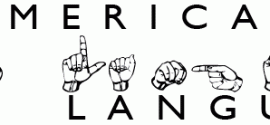
One Dyslexic’s Experience with Learning American Sign Language
CJ found learning ASL fairly easy. In each class he was given 45-50 vocabulary words to learn.
Read More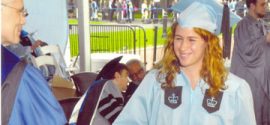
How Extended Time Improved More than Just Test Scores
Allison at her graduation from Columbia University, where she earned her master’s degree. Learning is not a game …
Read More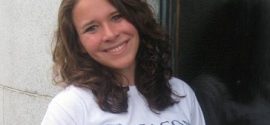
Giving Voice to a Young Person’s Dyslexia Journey
Jennifer realized she could help other kids—and their parents—by telling her own story, the story of a 12-year-old …
Read More